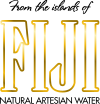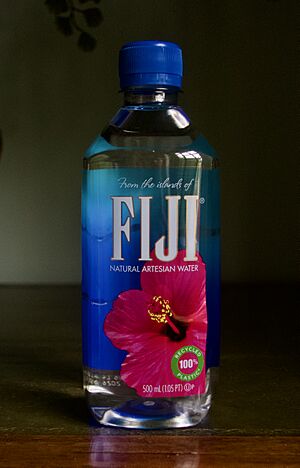Fiji Water facts for kids
 |
|
 |
|
| Country | Fiji |
|---|---|
| Introduced | 1996 |
| Source | Artesian aquifer |
| Type | Artesian |
| pH | 7.3 – 7.7 |
| Calcium (Ca) | 18 |
| Fluoride (F) | .26 |
| Magnesium (Mg) | 15 |
| Silica (SiO2) | 93 |
| TDS | 222 |
| All concentrations in milligrams per liter (mg/L); pH without units | |
Fiji Water is a popular brand of bottled water. It is owned by an American company called The Wonderful Company. The company says its water comes from a special underground water source, an artesian aquifer, located on the island of Viti Levu in Fiji. Fiji Water's main office is in Los Angeles, California.
Contents
How Fiji Water Started
Fiji Water was founded in 1996 by a Canadian businessman named David Gilmour. He named his company Natural Waters of Viti Ltd. In 2004, a company called Roll Global, which is now known as The Wonderful Company, bought Fiji Water from Gilmour. This purchase was for about US$50 million.
In 2010, Fiji Water also bought a company that makes wine, called Justin Vineyards & Winery.
Fiji Water and Fiji
Fiji Water collects its water from Yaqara, a place on the north side of Viti Levu. This is the largest island in Fiji. The water is then bottled and sent to other countries.
Working with the Fiji Government
Between 2007 and 2008, Fiji Water had some disagreements with the Fiji government. These issues were about taxes on exports. This led to legal problems and even some shipments of water being held back. At one point, water bottling companies in Fiji stopped working for a short time. The government later decided not to go ahead with a proposed tax of 20 cents per liter. In December 2008, Fiji Water had to let go of 40% of its workers because sales were not as strong.
In November 2010, Fiji asked David Roth, a director for Fiji Water, to leave the country. They said he was "interfering in Fiji's domestic affairs." After this, the tax on water producers increased significantly. This new tax mainly affected Fiji Water because of how much water they produced. The company decided to close its offices in Fiji on November 29, 2010. The goal of the tax increase was to get more money from Fiji Water for the Fiji Government.
There was talk that Fiji Water might move its operations to New Zealand. However, the Fiji government warned that if Fiji Water left, they might give the water source to another company. Because of this, Fiji Water announced they would start working again and accept the new tax.
By December 2010, Fiji Water's factory in Fiji had 400 employees. The company also started a foundation to help communities in rural Fiji get clean water. Many of these communities did not have access to clean water. By 2018, the number of communities without clean water had dropped to 12%.
In 2024, the Federal Trade Commission announced a recall of almost two million Fiji Water bottles. This was because some bottles sold between February and March had higher levels of manganese and certain types of bacteria. The U.S. Food and Drug Administration said these products were "not likely to cause adverse health consequence."
How Fiji Water is Advertised
Fiji Water uses the slogan "Earth's finest water" in its advertisements.
In 2006, Fiji Water ran an advertisement that said, "The label says Fiji because it's not bottled in Cleveland". The water department in Cleveland, a city in the US, felt this was an insult. The Cleveland Water Department then tested Fiji Water against Cleveland's tap water and other bottled water brands. Reports showed that Fiji Water contained a small amount of arsenic, while Cleveland's tap water had none.
Fiji Water and the Environment
In 2007, Fast Company magazine reported that the machines used to get water from underground at the Fiji Water factory run on diesel fuel. Making just one Fiji Water bottle uses a lot of water and much more energy than getting tap water.
In 2008, Fiji Water announced plans to plant natural forests to help reduce its carbon footprint. A carbon footprint is the total amount of greenhouse gases released by an organization or product. However, the part of the company's website that showed their progress was shut down by 2011. By 2019, only half of the promised forest area had been planted. Fiji Water's goal to be "carbon negative" (meaning they remove more carbon than they produce) is not expected to be met until at least 2037.
Aja Romano from Vox wrote about the bigger problem of shipping bottled water around the world. She mentioned that it creates a "giant mess of un-recycled plastic clogging landfills." While her comment was about the bottled water industry in general, her article focused on Fiji Water.
On January 31, 2025, an environmental group called The Plastic Coalition filed a lawsuit against Fiji Water. They claimed that the company's marketing of its product as "natural artesian water" was misleading. This was because tests showed the water contained tiny plastic pieces called microplastics and a chemical called BPA.
See also
 In Spanish: Fiji Water para niños
In Spanish: Fiji Water para niños
 | James Van Der Zee |
 | Alma Thomas |
 | Ellis Wilson |
 | Margaret Taylor-Burroughs |

